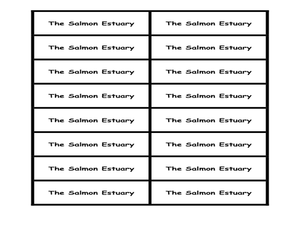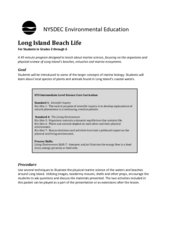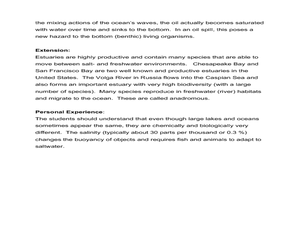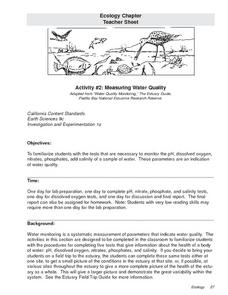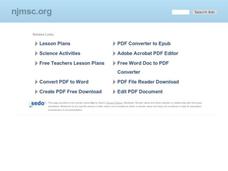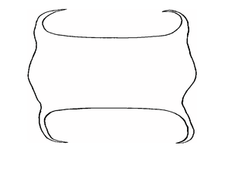Curated OER
Along Our Coast
Students explore the coast lines of Florida. They examine the benefits of estuaries and examine the estuary systems found along the coast. Students research and construct a saltwater food web.
Curated OER
For the Last 10,000 Years...
High schoolers study the National Estuarine Research Reserve System and discuss why they have important cultural artifacts. In this estuarine weather lesson students use the Internet and complete a worksheet.
Curated OER
The Salmon Estuary And Human Impacts
Learners have discussions and complete activities about the pacific salmon life cycle and marine parasites. In this salmon lesson plan, students complete activities such as observing sea lice, playing a tag game, and a board game.
Curated OER
Waterdrops
In this science activity, students learn about water resources and watersheds by reading and answering questions in this 8 pages newsletter. Students learn about salt vs. fresh water, discover the protective role of estuaries, learn...
Curated OER
Plankton in the Air
Here is a lab activity adequate for use with any full lesson on environmental factors that shape animal adaptations or marine animal characteristics. Pupils will discuss the role plankton plays in the environment and filter-feeding...
Curated OER
Long Island Beach Life
Have your class learn about marine life through this resource. This comprehensive instructional activity has learners discuss marine life, learn key vocabulary, discuss environmental concerns, and play games related to migration and...
Curated OER
Stacking Water
Students experiment with different salinities of water using straws and different colors of water. They collect and interpret data from the experiment.
Curated OER
Physiological Adaptations
Students investigate the concepts of genetics and how it is tied to the variations found within different species and how it is tied to adaptations. They review the theory of evolution and factors found to help create variation. The...
Curated OER
Make Your Own Paper Bag Manatee Puppet
In this science craft worksheet, students learn about the Florida manatee by constructing a paper bag puppet with extra pattern pieces for the head and flippers. Students read the information and study the drawings about manatees, then...
Curated OER
Food Webs
Students recognize interdependence in a food web by using yarn and notecards to create a food web and discussing what would happen if one of the organisms from a certain trophic level is removed.
Curated OER
WONDERFUL, WATERFUL WETLANDS
Learners list characteristics of wetland and describe the functions of a wetland.
Curated OER
Pollution Solutions
Students visit a local park to test the quality of the aquatic environments. They search for sources of pollution and examples of pollution control. Based on their obeservations and experiments, they rate their local environment.
Curated OER
Manatee Facts
In this math and science worksheet, students learn facts about the manatee by reading information on one page. Students answer 5 math word problems using the data they have read.
Curated OER
Manatee
In this science worksheet, learners color in the picture of the manatee and read the fact sheet that focuses upon its classification.
Curated OER
Chemosynthesis in the Classroom
Students observe the development of chemosynthesis in bacterial communities. In this bacteria instructional activity students explore that chemosynthesis is and how it is relevant to biological communities.
Curated OER
Teacher's Guide For: Water Temperature and Salinity Experiment
Learners experiment with water density, temperature and salinity. For this water lesson, students observe how the coldest water sinks to the bottom of a test tube, and how saltwater sinks in comparison to freshwater.
Curated OER
Measuring Water Quality
Learners are introduced to the various methods of measuring water quality. In groups, they test various water samples using the different methods, writing them down for pH, oxygen, salinity, and nitrate levels. They use their data to...
Curated OER
Maryland
In this Maryland reading comprehension worksheet, learners read a 2-page selection regarding the state and they answer 10 true or false questions pertaining to the selection.
Curated OER
Using SWMP Data
Students are introduced to the SWMP system which tracks short-and long-term changes in water. Using this data, they plot and interpret the data on a graph to determine how human activities are lowering the water quality. They also...
Curated OER
Wetlands/Watershed Model
Students make a model that will demonstrate the flow of surface water across the land in Texas and how materials that originate many miles away can end up in the wetland along the coast.
Curated OER
Wetlands/Watershed Model
Students work together to create a watershed model. They discover the flow of surface water on different topography. They examine how materials originate from miles away and end up in a different wetland.
Curated OER
Skates
Students gain understanding of structure, characteristics, and basic needs of living things and their role in world, identify parts of skate, observe details of skate's body and skate egg case, and identify unique characteristics of skates.




